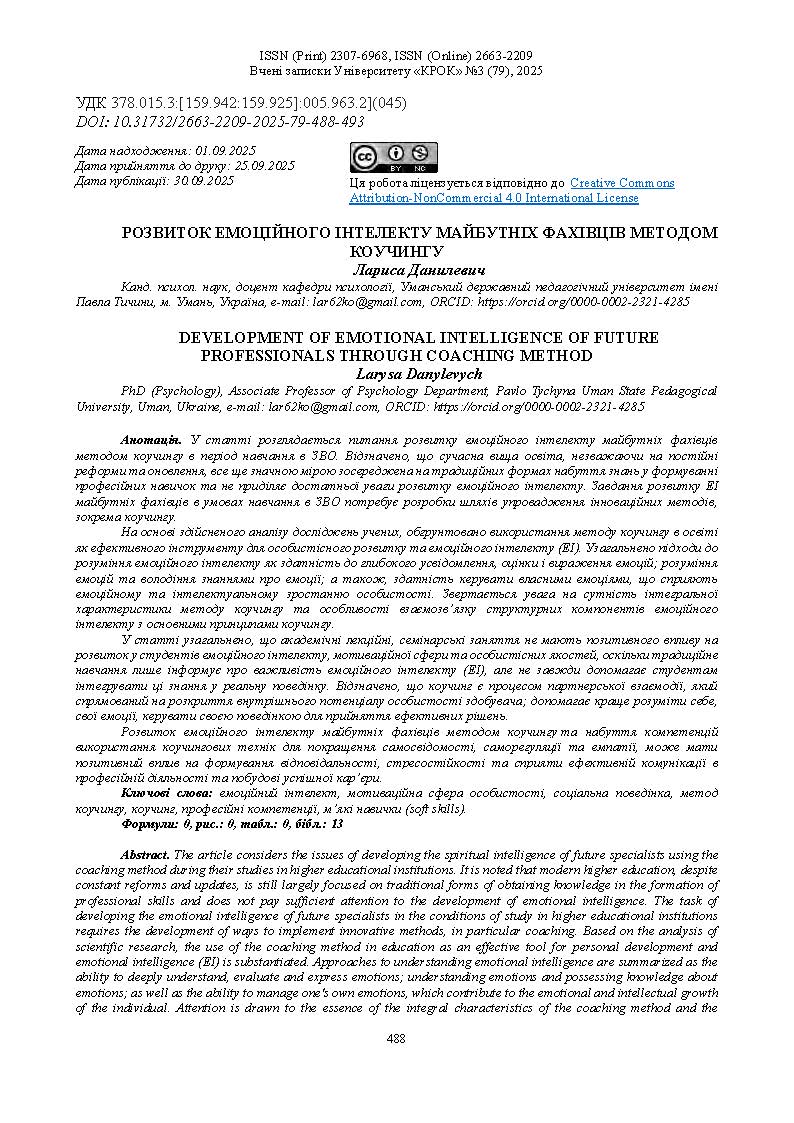РОЗВИТОК ЕМОЦІЙНОГО ІНТЕЛЕКТУ МАЙБУТНІХ ФАХІВЦІВ МЕТОДОМ КОУЧИНГУ
DOI:
https://doi.org/10.31732/2663-2209-2025-79-488-494Ключові слова:
емоційний інтелект, мотиваційна сфера особистості, соціальна поведінка, метод коучингу, коучинг, професійні компетенції, м’які навичкиАнотація
У статті розглядається питання розвитку емоційного інтелекту майбутніх фахівців методом коучингу в період навчання в ЗВО. Відзначено, що сучасна вища освіта, незважаючи на постійні реформи та оновлення, все ще значною мірою зосереджена на традиційних формах набуття знань у формуванні професійних навичок та не приділяє достатньої уваги розвитку емоційного інтелекту. Завдання розвитку ЕІ майбутніх фахівців в умовах навчання в ЗВО потребує розробки шляхів упровадження інноваційних методів, зокрема коучингу.
На основі здійсненого аналізу досліджень учених, обгрунтовано використання методу коучингу в освіті як ефективного інструменту для особистісного розвитку та емоційного інтелекту (ЕІ). Узагальнено підходи до розуміння емоційного інтелекту як здатність до глибокого усвідомлення, оцінки і вираження емоцій; розуміння емоцій та володіння знаннями про емоції; а також, здатність керувати власними емоціями, що сприяють емоційному та інтелектуальному зростанню особистості. Звертається увага на сутність інтегральної характеристики методу коучингу та особливості взаємозв’язку структурних компонентів емоційного інтелекту з основними принципами коучингу.
У статті узагальнено, що академічні лекційні, семінарські заняття не мають позитивного впливу на розвиток у студентів емоційного інтелекту, мотиваційної сфери та особистісних якостей, оскільки традиційне навчання лише інформує про важливість емоційного інтелекту (ЕІ), але не завжди допомагає студентам інтегрувати ці знання у реальну поведінку. Відзначено, що коучинг є процесом партнерської взаємодії, який спрямований на розкриття внутрішнього потенціалу особистості здобувача; допомагає краще розуміти себе, свої емоції, керувати своєю поведінкою для прийняття ефективних рішень.
Розвиток емоційного інтелекту майбутніх фахівців методом коучингу та набуття компетенцій використання коучингових технік для покращення самосвідомості, саморегуляції та емпатії, може мати позитивний вплив на формування відповідальності, стресостійкості та сприяти ефективній комунікації в професійній діяльності та побудові успішної кар’єри.
Завантаження
Посилання
Августюк, М. М. (2022). Методичні поради до підвищення рівня емоційного інтелекту в здобувачів вищої освіти. (94 с.) Острог : Вид-во Націон. університету «Острозька академія».
Моргун, В. Ф. (2010). Емоційний інтелект у багатовимірній структурі особистості. Постметодика, 6(97), 2–15.
Нежинська, О. О., & Тименко, В. М. (2015). Використання коучингу в системі вищої освіти України. Вісник післядипломної освіти, 15(28), 236–245.
Нежинська, О. О. (2017). Основи коучингу : навч. посібник. (220 с.) Київ ; Харків : ТОВ «ДІСА ПЛЮС».
Носенко, Е. Л., & Коврига Н. В. (2003). Емоційний інтелект : концептуалізація феномену, основні функції: моногр. 126 с. Київ: Вища школа.
Параскевова К. Г. (2015). Емоційний інтелект як чинник регуляції емоційно-мотиваційної сфери особистості : Автореф. дис. … к. психол.н. (17 с.) Харків : ХНУ імені В. Н. Каразіна.
Подофєй, С. О. (2019). Емоційний інтелект особистості й особливості його становлення Науковий вісник Херсонського держ. універ-ту. Серія Психологічні науки, 1, 260–265.
Сингаївська, І., & Іванова, О. (2023). Коучинговий підхід як інструмент для встановлення довірливих стосунків між батьками і підлітками. Вчені записки Університету «КРОК», 2(70), 166–172. - DOI 10.31732/2663-2209-2022-70-166-172
Чернишова, Л. І., & Жовта, Д. В. (2020). Тенденції розвитку коучингу в Україні. Сучасний менеджмент економічних систем в координатах парадигми сталого розвитку : Матеріали ІІ Міжнар.наук.-практ. конференції. Дніпро: Середняк Т. К., 164–166.
Goleman, D. (1995). Emotional intelligence. New York : Bantam Books, 352 p.
Goleman, D., Boyatzis, R., & McKee, A. (2002). Primal Leadership: Realizing the Power of Emotional Intelligence. Harvard Business School Press, Boston.
Anthony, M Grant (2012). Coaching for leadership and emotional intelligence.
Mayer, J.D., & Salovey, P. (1993). The Intelligence of emotional intelligence. Intelligence, 17(4), 433–442.

Downloads
Опубліковано
Як цитувати
Номер
Розділ
Ліцензія

Ця робота ліцензується відповідно до Creative Commons Attribution-NonCommercial 4.0 International License.

